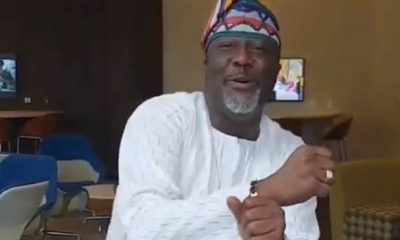Nigeria News
Dino Melaye appeals against judgment recall process
![APC Has Failed Nigerians, Can't Move Nigeria Forward - Melaye [Video]](https://www.naijanews.com/wp-content/uploads/2017/04/dinomelaye.png)

Senator Dino Melaye representing Kogi West Senatorial District on Wednesday filed an eight-ground notice of appeal before the Court of Appeal in Abuja challenging the order of the Federal High Court in Abuja to commence his recall process.
Justice Nnamdi Dimgba, in his judgment permitted the Independent National Electoral Commission to proceed with the recall process of the senator.
The senator, according to Punch report, through his lawyer, Chief Mike Ozekhome (SAN), argued in his first grounds of appeal that Justice Dimgba erred in law “when he held that the petition presented to INEC” for his recall “was valid, even when the petition exhibited by INEC was not signed by more than half of the registered voters in the plaintiff’s appellant’s constituency as is required by Section 69 of the 1999 Constitution.”
He maintained under this grounds of appeal that “the petition presented to INEC “by the purported constituents and exhibited before the court as Exhibit lNEC 1, was only signed by three persons, which number is less than the half of the registered voters” in the constituency “as provided for by Section 69 of the constitution.”
Read also: INEC resumes Melaye’s recall process
He also maintained that “a mere statistical analysis and general summary for the recall of Senator Dino Melaye (Exhibit DM13) done by INEC itself and wholly relied upon by the trial court to hold that the petition was valid, can neither replace nor take the place of the petition itself, which was tendered by INEC as an exhibit.”
In the second grounds of appeal, the appellant held that the trial judge erred in law “when he held that the 90 days provided for by Section 69 of the Constitution of the Federal Republic of Nigeria, as altered, was paused since June 23, 2017, when the plaintiff/appellant commenced this action and subsequently ordered that the period would continue to run from September 11, 2017, the date of the judgment of the trial court” was delivered.
He maintained that contrary to the judge’s finding, “the time fixed by the constitution for the doing of an act cannot be extended or expanded or elongated or in any way enlarged regarding what is to be done where not done within the time so fixed.”
According to him, such time fixed by the constitution, “lapses since the court has no jurisdiction to extend the time fixed by the constitution for the doing of an act.”
“Elongating or extending the time as fixed by the constitution requires constitutional amendment and not at the whims and caprices of a trial court,” the appellant added.
He also argued in another grounds of appeal that Justice Dimgba was wrong “by failing to consider the Notice to Produce issued on INEC to produce the petition for the recall of the plaintiff/ appellant and not invoking the provisions of Section 167(d) of the Evidence Act, in the face of failure of the INEC to produce the purported petition allegedly signed by the plaintiff’s/appellant’s constituents despite service of a notice to produce on it.”
Melaye added that instead of doing this, the judge relied “on mere statistical analysis prepared by INEC itself to validate a petition which was invalid on its face.”
Read also: We have nothing to do with Melaye’s recall – Kogi government
Giving the particulars of the said error, the appellant stated that INEC, in its counter-affidavit to this originating summons, “exhibited the purported petition for the recall of the plaintiff which was signed by only three persons, a number grossly less than the number as required by the constitution.”
He added that he issued and served on INEC a notice to produce the petition for the recall as signed by more than half of the registered voters in the plaintiff’s constituency, “which it failed to do.”
He added, “Notwithstanding the Notice to Produce, INEC failed, refused and neglected to produce the said petition before the court.
“The court failed to invoke the provisions of Section 167(d) of the Evidence Act to the effect that failure by INEC to produce the said petition meant that such petition, if it were produced, would have been adverse to the interest of lNEC.”
Read also: Police kill notorious robber and kidnapper who attempted to assassinate Senator Melaye
In another grounds of appeal, the appellant contended that the judge erred in law “when he failed to act on uncontroverted facts in the plaintiff’s/appellant’s affidavit in support of his originating summons and also his further affidavit in opposition to the defendant’s/respondent’s affidavit in opposition to the plaintiff’s originating summons.”
Justice Dimgba had while directing INEC to proceed with the signatures verification, also ordered the commission to issue an amended recall timetable giving the senator a minimum of two weeks to equip himself to be able defend himself against the recall process.
He ordered that the amended timetable, alongside the copies of the petition, the list of signatures and the list of the names of the voters who signed in support of the recall petition, be served on Melaye.
He held that contrary to Melaye’s contention, there was no provision in Section 69 of the constitution requiring his constituents to afford him fair hearing before sending such petition to INEC.







![Just In: Dino Melaye Makes Fresh Allegations Against Buhari, CBN Gov, INEC - [Video]](https://www.naijanews.com/wp-content/uploads/2017/03/Senator-Dino-Melaye-740x431.png)

